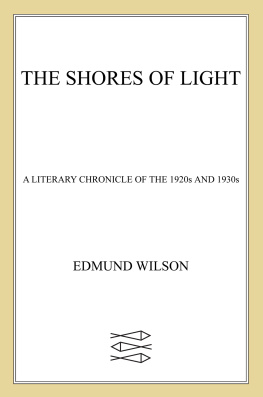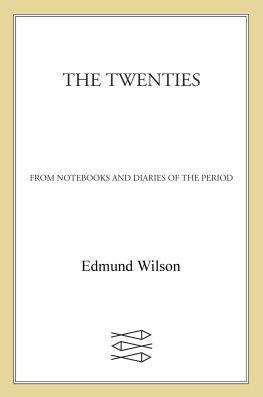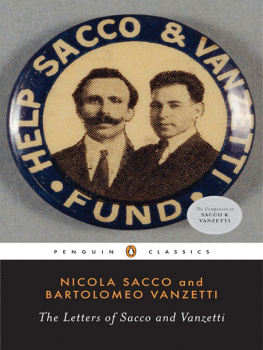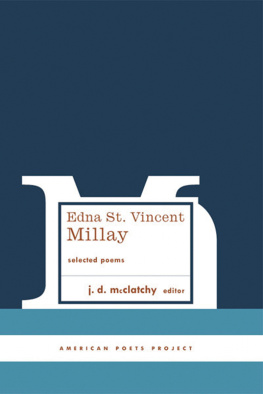The Shores of Light
A Literary Chronicle of the Twenties and Thirties
BY
EDMUND WILSON
With a Foreword by Daniel Aaron

Farrar, Straus & Giroux
The author and publisher have provided this e-book to you for your personal use only. You may not make this e-book publicly available in any way. Copyright infringement is against the law. If you believe the copy of this e-book you are reading infringes on the authors copyright, please notify the publisher at: http://us.macmillanusa.com/piracy.
T HIS BOOK was originally planned as a companion volume to my Classics and Commercials: A Literary Chronicle of the Forties: a similar selection from my literary articles published during the twenties and thirties; but it has turned into something rather different. I have aimed in the present collection to present a kind of panorama of the books and the ideas, the movements and the literary life, of a period that was very much livelier and had a much more exciting development than the war-darkened years of the forties. I have therefore included some youthful stuff that can only, if at all, be of interest from an historical point of viewin showing how it looked to a contemporary; and I have not confined myself, as in the earlier volume, to essays and reviews, but have admitted dialogues, jeux desprit, satires, short sketches and personal letters. I have even put in a few pieces that do not deal with writing at all, but these, too, are intended to contribute to a general picture of the culture of a recklessly unspecialized era, when minds and imaginations were exploring in all directions. I have suppressed the worst of my aberrations, and I have thoroughly revised almost everything, sometimes trimming and toning down what I originally wrote and sometimes expanding it with material taken from my old notes. In the case of some articles that had been hastily written, I have found it a satisfaction to get them into better shape, even after twenty or thirty years. In this volume, I have not arranged the pieces in strictly chronological order, but have sometimes grouped them in such a way as to put together pieces on the same subject or to bring out some special aspect of the period.
The reader may find here, as I have done, attitudes that surprise or amuse him; but I have generally refrained from comment and leave him to do his own discounting. The self-assertive approach of the twenties, which seems rather brash today, I have not always been able to eliminate. We had grown up on the journalism of Shaw and Chesterton, Belloc and Max Beerbohm, and later, in the United States, of the Mencken and Nathan of the Smart Set and the Woollcott and Broun of the World. All these writers were everlastingly saying I: the exploitation of personality had become an integral part of criticism. It all stemmed, I suppose, from Oscar Wilde, who had a genius for self-dramatization and who was imitated in this respect by Bernard Shaw. In the twenties a young man who was still nobody made a point of saying II dont like so-and-so, I cant read so-and-so, I have always thought so-and-so,in the hope of being taken for somebody. Now the habit has gone out of fashion. Aside from this personal emphasis, however, I have not reprinted here very much that I disapprove of, as of the date when it was first writtenthough, of course, I see some things today in a somewhat different perspective: in the light of the authors subsequent work or of my own better information. I have sometimes had to leave in passages that are more or less duplicated in my other books, but I do not suppose that this will worry anybody. I apologize for printing documents in which other writers pay me compliments, but this is part of this ancient history, too, and I have offset them by putting in others in which I am taken to task. I have added a few pieces of later date, whose presence explains itself.
Of these ninety-seven pieces, seventy-three first appeared in the New Republic. Christian Gauss as a Teacher of Literature was first printed in the American Scholar; The Literary Workers Polonius in the Atlantic Monthly; F. Scott Fitzgerald in the Bookman; Marxism at the End of the Thirties in the New York Call; The Classics on the Soviet Stage in the Moscow Daily News; Mr. E. A. Robinsons Moonlight, A Lost Lady, Byron and His Biographers, Late Violets from the Nineties, Sherwood Andersons Many Marriages, Ring Lardners American Characters, Mr. Hemingways Dry-Points and The Seven Lively Arts in the Dial; The Pleasures of Literature and Edna St. Vincent Millay in the Nation; The Great Audience, Things As They Are, Dream Poetry and the second article, of which part is given under Talking United States, in the New Yorker; The New Byron Letters in the New York Tribune; and One of Ours and Eugene ONeill as Prose Writer in Vanity Fair. The following pieces were included, after their first periodical publication, in collections of essays by various hands: F. Scott Fitzgerald in The Literary Spotlight, published by George H. Doran in 1924; The All-Star Literary Vaudeville in American Criticism, published by Harcourt, Brace in 1926; and Notes on Babbitt and More in The Critique of Humanism, published by Brewer & Warren in 1930. The Satire of Samuel Butler appeared in my book The Triple Thinkers, published by Harcourt, Brace in 1938, but was removed in a later edition to make room for new material. The two Imaginary Dialogues are reprinted from a book of mine, Discordant Encounters, published by Albert & Charles Boni in 1926.
I have to thank Mr. Ernest Hemingway, Mr. Henry Miller, M. Andr Malraux and Mr. John Crowe Ransom for permission to print their letters; Mr. Leonard Woolf for permission to reprint a letter of Virginia Woolf; Miss Norma Millay for permission to print two letters of Edna St. Vincent Millay; Mr. Harold R. Medina for permission to reprint his tribute to Christian Gauss from the Princeton Alumni Weekly; Brandt & Brandt for permission to include To Love Impuissant from A Few Figs From Thistles, published by Harper & Brothers, copyright 1920, 1948, by Edna St. Vincent Millay, and Portrait from The Buck in the Snow, published by Harper & Brothers, copyright 1928 by Edna St. Vincent Millay; and Mr. Philip Horton for permission to include a quotation from a letter of Hart Crane included in his biography Hart Crane. The words and music of Wedding Joy are reprinted by permission from the Botsford Collection of Folk Songs, copyright 1929 by G. Schirmer, Inc.
i
I N THE fall of 1949, Edmund Wilson began to sort out reviews and articles he had contributed in the twenties to various magazines and newspapers. Two years later, he mentioned in a letter to Vladimir Nabokov that his as yet untitled gigantic book (it by then included pieces from the thirties) was turning into a sort of volume of literary memoirs. He described its contents more precisely in his preface to The Shores of Light, published in 1952: a general history of the culture of a recklessly unspecialized era, when minds and imaginations were exploring in all directions. Given his pessimistic view of a post-World War II society dominated, he felt, by intellectual pitchmen and shallow entertainers, it is no wonder that he should have looked with a certain nostalgia, if on the whole unsentimentally, to a period made golden by distance when he and his friends were full of great expectations for literature and America.
















